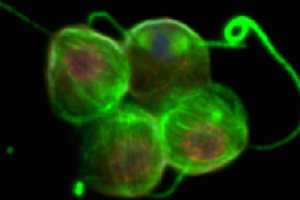Sex Is a Coping Mechanism
Nautilus
 According to a new finding, described as a "shock" by its discoverers, a single mutation 600 million years ago may be responsible for the emergence of complex organisms -- including all of the plants and animals that we are familiar with -- from a single-celled ancestor. This evolutionary accident enabled cells to communicate with each others and therefore to cooperate.
According to a new finding, described as a "shock" by its discoverers, a single mutation 600 million years ago may be responsible for the emergence of complex organisms -- including all of the plants and animals that we are familiar with -- from a single-celled ancestor. This evolutionary accident enabled cells to communicate with each others and therefore to cooperate.
 Fossils established the Brain Boom as fact. But they tell us next to nothing about how and why the human brain grew so large so quickly. In the last eight years, however, scientists have started to answer the “how” of human brain expansion — that is, the question of how the supersizing happened on a cellular level and how human physiology reconfigured itself to accommodate a dramatically enlarged and energy-guzzling brain.
Fossils established the Brain Boom as fact. But they tell us next to nothing about how and why the human brain grew so large so quickly. In the last eight years, however, scientists have started to answer the “how” of human brain expansion — that is, the question of how the supersizing happened on a cellular level and how human physiology reconfigured itself to accommodate a dramatically enlarged and energy-guzzling brain.
 Cooperative colonies — ants, termites, and some wasps and bees — have fascinated scientists for more than a century because they pose an evolutionary conundrum. Only a very small number of insects actually get to reproduce: the queens and their mates. The rest give up their chance to contribute to the gene pool, caring for the offspring of others instead. How did this lifestyle, known as eusociality, evolve?
Cooperative colonies — ants, termites, and some wasps and bees — have fascinated scientists for more than a century because they pose an evolutionary conundrum. Only a very small number of insects actually get to reproduce: the queens and their mates. The rest give up their chance to contribute to the gene pool, caring for the offspring of others instead. How did this lifestyle, known as eusociality, evolve?
 By comparing the genomes of different species of molds scientists have reconstructed their history. On Thursday, the scientists reported that cheese makers unwittingly have thrown their molds into evolutionary overdrive.They haven’t simply gained new genetic mutations to help them grow better in cheese. Over the past few centuries, these molds also have picked up large chunks of DNA from other species in order to thrive in their new culinary habitat.
By comparing the genomes of different species of molds scientists have reconstructed their history. On Thursday, the scientists reported that cheese makers unwittingly have thrown their molds into evolutionary overdrive.They haven’t simply gained new genetic mutations to help them grow better in cheese. Over the past few centuries, these molds also have picked up large chunks of DNA from other species in order to thrive in their new culinary habitat.
Spread the word